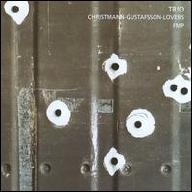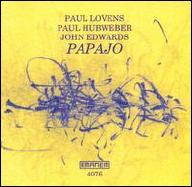Although influenced by beat and British Invasion music, Lovens quickly fell into playing jazz, beginning with the traditional variety but quickly spreading into modern adventurism as the music of the '60s began to present itself as a reflection of the rebellious, liberating spirit of those times. A major early influence was the Dutch multi-instrumentalist Han Bennink, one of the great drummers in jazz. Lovens recalls that even when he technically couldn't play in the manner of Bennink, he did what he could by at least imitating Bennink's appearance, including getting his head shaved close in the manner of the Dutchman and wearing the same style of pants.
One of the earliest collaborative groups involved Lovens in a trio with Berlin pianist Alexander Von Schlippenbach and British saxophonist Evan Parker, and this turned into one of the longest-running steady groups in jazz, celebrating its 29th anniversary in 2001. The trio tours at least once every year and has released more than a dozen albums, some in a quartet setting with the addition of American bassist Alan Silva. Lovens' playing in this setting is very typical of his musical approach. The drums are not only in their expected traditional jazz role as underpinning for saxophone, piano, or other normally perceived soloing instruments, Lovens frequently cuts above the rest of the band using techniques such as grinding the tip of a drumstick into the face of the cymbal, or he creates fascinating sound textures using notched wooden blocks, horse combs, and other paraphernalia. His sensitive improvisation techniques and great ability at interplay have placed him constantly in demand as a partner in improvising groups, and since the early '70s, he has worked with a who's-who of European improvisers such as bassist Peter Kowald, who 30 years later still picked Lovens as his favorite rhythm section partner, the large Globe Unity Orchestra under the direction of Schlippenbach, Swedish saxophonist Mats Gustafsson, trumpeter Toshinori Kondo, bassist Joelle Leandre, and many others.
In the mid-'70s he began his own vinyl label imprint, Po Torch, releasing a series of percussion duets with British drummer Paul Lytton, among other projects. Meticulous attention was paid to packaging and artwork, and one result was the album The Last Supper, a duet with Kondo, being chosen for a hard-cover coffee table volume collection of artistic album covers. In the late '80s, Lovens performed with American free jazz giant Cecil Taylor as part of a series of collaborations involving Taylor with various European improvisers. This led to several years in the drum seat of the Taylor combo, climaxing in the entire band basically getting fired on-stage in New York in 2000, a typical event in this fiery pianist's career, but one that left Lovens deeply disappointed.
He continued reinventing himself and broadening his horizons, and in 1996 formed the duo Me and Paul with guitarist, banjo player, and vocalist Eugene Chadbourne. Proceeding in his usual manner and playing in pretty much the same style he does with all his groups, Lovens figured out a way to accompany bluegrass, country, rock, and swing standards without compromising the freedom that is the essence of his art. And, in a very real tribute to the father he misses so much, Lovens does all the accounting for every group he performs with. ~ TiVo Staff, Rovi














